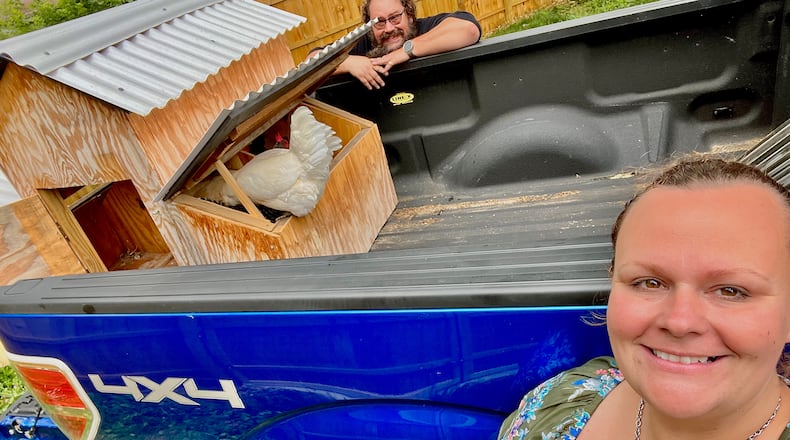Growing up in Celina, Heather was raised around large family gardens and her family also hunted and fished for their own fresh food.
“My grandfather is of Native American descent,” Heather said. “Having a garden and living off the land is part of my heritage and culture.”
Heather graduated from Celina High School in 2004 and attended Wright State University’s Lake Campus where she graduated in 2008 with a degree in liberal studies. After college, Heather moved to Kettering for work, but because she lived in a small rental home with very little space for a vegetable garden, she worked on flower gardens instead.
“By the time I got the soil ready for planting, my lease was up, and my roommates wanted to move,” Heather said.
From there, Heather moved to an apartment in Kettering with no yard, so she did her best to grow herbs in her windowsills. Then in 2016, after having surgery on her leg, Heather moved back home to Celina.
“My surgery was delicate, and I wasn’t allowed to even use crutches to get around,” Heather said. “I thought my dreams of having a huge garden were gone forever.”
But Heather also knew that dreams never really die as long as they are encouraged. She moved to another apartment in Russia, Ohio, and in 2021, she met her future husband, Bob Butler.
“I met Bob when he showed up at one of my karaoke shows,” Heather said. “By the time the show was over, it was so late that Bob ended up staying on my couch.”
And the rest, as they say, is history.
“On weekends, I was doing disc-jockey gigs so I could pay off my student loans,” Heather said. “Then Bob happened, and he right away asked me about my dreams for my life.”
Then Heather broke her hand and Bob asked her to stay with him in Dayton so he could help her with recovery. As they continued to get to know one another, they decided to move in together permanently.
“We agreed we wanted to start a garden at Bob’s house,” Heather said.
This was the beginning of “Hogs and Hens Urban Farm.” In 2022, the couple expanded to the 16 raised-garden beds they have today.
“In January of 2022, we were taking this epic road trip together along Route 66,” Heather, who along with her now husband, is a huge music lover, said. “We got engaged while standing on a corner in Winslow, Arizona.”
The couple got married at their house in Dayton in July 2022 and threw a backyard barbecue and party for family and friends afterward. Throughout the wedding reception, guests asked the couple how they managed to plant such a large garden while planning a wedding and traveling.
“We planned it carefully and set up systems so it would be mostly self-sufficient,” Heather said.
With seemingly so much interest in the couple’s urban garden adventure, they decided to start a podcast as a way to share their techniques and tips with more people. The first podcast aired in December 2022.
“I really thought just my friends and family would listen,” Heather said. “But we ended up getting about 12,000 people tuning in.”
Today, the couple continues putting together weekly episodes of “The Urban Permaculture Podcast” on subjects ranging from irrigation and financing a garden to urban garden types. They are now growing about 75% of their own food and giving away what they don’t use to people who don’t have any other access to fresh produce.
The Butlers’ garden is 100% organic, and they make their own compost — using shredded paper, vegetable scraps, chicken manure and eggshells. They use no chemicals and fight pests using fencing and companion planting, with plants that naturally repel bugs.
“There is very little weeding required because we put cardboard down on top of the soil,” Heather said. “We put mulch on top of that and the wood soaks up moisture, so we don’t have to water as often.”
Though grass is usually the plant of choice for most modern homeowners, Heather said grass isn’t good for the environment. The couple is slowly replacing all the grass with plants like creeping thyme to attract pollinators.
The Butlers have a mission to educate as many people as possible about urban farms.
“Even with a small amount of land, you can grow a ton of food,” Heather said. “I know of a couple who are able to grow enough food to feed a family of five on just a quarter of an acre. I’d rather teach folks how to help themselves rather than relying on handouts.”
For more information, log on to hogsandhensdayton.com
About the Author






